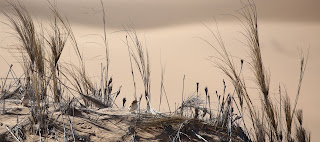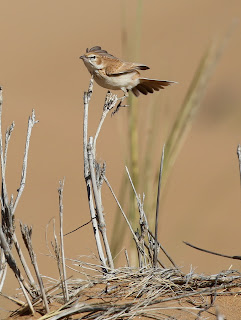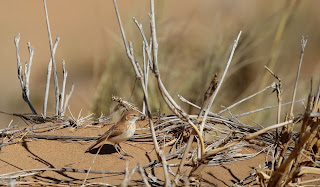Here at last!
Drove into Khadoum National Park on 28th July. The track wasn't bad at all (we had been told it was really bad)! Khadoum had been on my radar for a while, but I had been put off by the fact that at least two vehicles have to travel together as the place is so remote. So Delana had organised a trip with friends from Tsumeb, eight people in four vehicles.
The drive from Tsumeb is a long one & most of it is on gravel. However the dirt road was 276 kilometers but it was OK, just a little sandy in patches, nothing too difficult at all. The road into the national park was also in fairly good condition, so no problems at all encountered.
Tracks although 4 x 4, were quite good.
Khadoum is a Kalahari wilderness. The south where we are, is arid Kalahari woodland & bush interspersed with open grassland & nice fossil rivers. on this trip we had no time to explore the teak woodlands of the north (where all the good birds are)! This national park sees few visitors & as one drives around you have the entire place to yourself. The park is 3,874 square kilometers & it is basically broad leaved tree & shrub savanna. Game is not prolific & neither is the bird life but we all enjoyed the wilderness that we lived in for a four night stay. Definitely our next trip here will be longer.
Made it at last!
Spent the rest of the afternoon setting up camp, so no birding or animal watching done. Enjoyed a nice evening around the camp fire.
Delana with swishing marks on the track,
made by Elephants trailing their trunk!
The view from the hide.
The hide itself was excellent,
giving great views of the pan
& valley.
Hi!
We saw quite a few Ostrich
during the afternoon.
Elephants dominate waterholes here.
Roan look on patiently!
Dusk.
The
29th was spoiled somewhat, by the warden telling us we had camped in the wrong place & we had to move! So nothing done in the morning.
Delana & I drove out to
Tsoana Waterhole in the afternoon. It was a nice drive down the side of a dry river valley & we spent the last two hours in a good hide overlooking the waterhole. Lots of Elephants dominated the waterhole. We drove back in the dark, but nothing seen.
Honey Badger
He was a real nuisance!
Nice track along the old river.
Nice male Roan
Burchell's Sandgrouse
Roan were dotted all along the watercourse.
Red crested Korhaan
The next day we were up early & we drove north to Soncana Waterhole. It was a lovely morning drive & we saw a good selection of both game & birds.
This hide has seen better days!
Elephant coming to drink at mid-day.
These Roans were getting ready to mate.
Kudu
This young male was very aggressive.
It gets a bit busy sometimes!
Then further north to
Omuramba Waterhole, which late morning/early afternoon was packed with game: mainly Roan & Elephant but also Kudu & Gemsbok.
Big herds arrived in late afternoon at Socana.
Yet another Honey Badger!
We then returned to camp for a late lunch & revisited
Soncana again for sun-downers.
Typical Kalahari bushveld.
There were groups of Burchell's Sandgrouse
dust bathing early in the morning.
Buffy Pipit
Fawn coloured Lark
Gabar Goshawk
Immature Martial Eagle
This bird proved to be very co-operative.
Part of the view from the hide.
Blue Wildebeest
Breakfast at the hide. It was excellent!
On the
31st July we once again drove to
Tsoana & spent the whole morning there, enjoying lot of game coming to drink & a very nice brunch on site. The afternoon was spent around camp doing a little birding but not much was seen.
Meanwhile back in camp.....
Our little friend was back!
Getting into mischief!
An absolute terror! He was into everything!
The 1st August! Another month has flown by! It was time to pack up & drive back to Tsumkwe Lodge where we spent the night camping. We said good bye to everyone & once more we were on our own. It was nice to have a bit of down time, sorting out my photos & trying to get my blog up to date.
Mammals:
Elephant (large herds at waterholes, up to a 100 together); Scrub Hare; Black backed Jackal; Blue Wildebeest (herds of up to 65); Gemsbok 4; Honey Badger 3; Kudu (herds of up to 15); Roan ( small groups often encountered while driving around, also up to 20 animals at various waterholes; Steenbok 14 & Warthog 35.
Best birds:
Ostrich 20; Red billed Spurfowl; Martial Eagle 3; Brown Snake Eagle; Bateleur 4; Gabar Goshawk; White faced Scops Owl; Pearl spotted Owl; Barn Owl; Fiery necked Nightjar; Kori Bustard; Red crested Korhaan; Namaqua Sandgrouse 20; Burchell's Sandgrouse 450; Double banded Sandgrouse 16; Bearded Woodpecker; Cape Penduline Tit 3; Fawn coloured Lark; Grey backed & Chestnut backed Sparrow Larks; Long billed Crombec; Southern Pied Babbler; Marico Flycatcher; Red headed Finch; Black faced Waxbill; Buffy Pipit; African Pipit & Yellow Canary.
71 species recorded.












































































